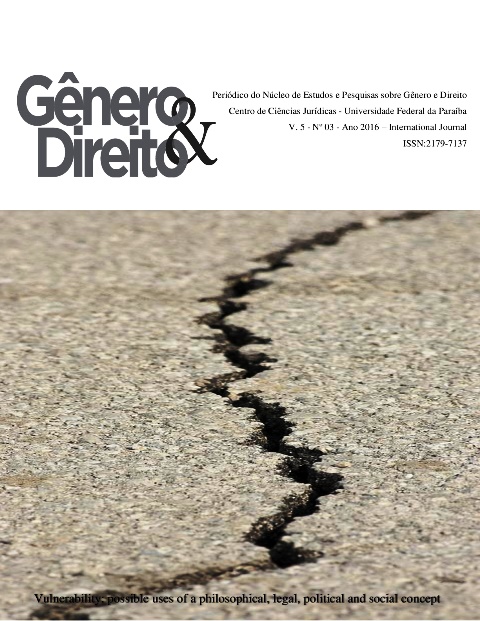INSEGUROS Y LIBRES: VULNERABILIDAD Y RESILENCIA EN EL LÉXICO POLÍTICO-JURÍDICO DEL NEOLIBERALISMO
Palavras-chave:
Resilience, vulnerability, risk, neoliberalism, public policiesResumo
Over the past few years, the political and legal debate of government’s new strategies about social complexity has been followed by the representation of individual and collective increasing vulnerability imposed by the process of transformation that has affected the concept of risk. The scenario returned by threat exposure coming from the representation of global political uncertainty actives human decision in a perspective that changes concept and historical form that risk definition process offered to modern society. In these terms, either vulnerability concept or resilience model functionalize a representation describing the exposition to uncertainty offered by the crisis of the calculable risk definition: they conceptually return to an appeal of explicative ability of categories and meanings attributed by theories of complexity borrowers of an epistemological approach of natural science defining the possible government policy in a scenario characterized by fast and unpredictable changesDownloads
Referências
Anthony, E. James y Koupernik, Cyrille (eds.) (1974), The child in his family: Children at psychiatric risk. Oxford: Wiley & Sons.
Beck, Ulrich (1986), Risikogesellschaft. Auf dem Weg in eine andere Moderne. Frankfurt am Main: Suhrkamp.
Boyd, Emily y Folke, Carl (eds.) (2011), Adapting Institutions. Governance, complexity and Socio-Ecological Resilience. New York: Cambridge University Press.
Brooks, Robert y Goldstein, Sam (2003), The Power of Resilience: Achieving balance, confidence and Personal Strength in Your Life. New York: McGraw Hill.
Campesi, Giuseppe (2009), “Rischio e sicurezza nella società globale. A proposito dell’ultimo libro di Ulrick Beck”, Studi sulla questione criminale, IV, 2: 107-118.
Canguilhem, Georges (1998), Le normal et le pathologique. Paris: Presses Universitaires de France.
Casadei, Thomas (ed.) (2012), Diritti umani e soggetti vulnerabili. Violazioni, trasformazioni, aporie, Torino: Giappichelli.
Castel, Robert (2003), L’insécurité sociale: Qu’est-ce qu’être protégés?, Paris: Éd. du Seuil.
Costa, Pietro (2001), Civitas. Storia della cittadinanza in Europa. 3. La civiltà liberale. Roma-Bari: Laterza.
Douglas, Mary (1966), Purity and Danger. An Analysis of Concepts of Pollution and Taboo. Harmondsworth: Penguin.
Douglas, Mary (1992), Risk and Blame. London: Routledge.
European Commission, Communication from the Commission to the European Parliament and Council, Adapting to climate change: Towards a European framework for action, (COM [2009], 147).
European Commission, Communication from the Commission to the European Parliament and Council, A Community Approach on the Prevention of Natural and Man-made Disasters, Brussels, (COM [2009], 82).
European Commission, Communication from the Commission to the European Parliament and Council, The EU Approach to Resilience: learning from Food Security Crises (2012): (COM [2012] 586).
Evans, Brad y Reid, Julian (2013), “Dangerously exposed: the life and death of the resilient subject”, Resilience: International Policies, Practices and Discourses, 1, 2: 83-98.
Ewald, François (1986), L’Etat Providence. Paris: Grasset et Fasquelles.
Foucault, Michel (2004), Naissance de la Biopolitique. Cours au Collège de France 1978-1979. Paris: Seuil/Gallimard.
Galaz, Victor, Olsson, Per et al. (2008), “The problem of fit between ecosystems and governance systems: insights and emerging challenges”, in Young, King, Schroeder (eds.), The Institutional Dimensions of Global Environmental Change: Principal Findings and Future Directions. Boston (MA): MIT Press.
Giddens, Anthony (1990), The Consequences of Modernity. Cambridge: Polity Press.
Gunderson, Lance H. y Holling, C. S. (2002), Panarchy. Understanding Transformations in Systems of Humans and Nature. Washington: Island Press.
Holling, C. S. (1973), “Resilience and Stability of Ecological Systems”, Annual Review of Ecology and Systematics 4: 1-23.
Holling, C. S. (1991), Soziologie des Risikos. Berlin: W. de Gruyter.
Holling, C. S. (2007), Weltrisikogesellschaft. Auf der Suche nach der verlorenen Sicherheit. Frankfurt am Main: Suhrkamp.
Lasch, Christopher (1984), The Minimal Self. Psychic Survival in Troubled Times. New York: W.W. Norton, New York.
Luhmann, Niklas (1992), Beobachtungen der Moderne. Opladen: Westdeutsche Verlag.
Natoli, Salvatore (1999), Progresso e catastrofe. Dinamiche della modernità. Milano: Marinotti.
Nussbaum, Martha (2002), Giustizia sociale e dignità umana. Da individui a persone. Bologna: il Mulino.
O’Malley, Patrick (2012), “Uncertain Governance and Resilient Subjects in the Risk Society”, Oñati Socio-Legal Series, 3, 2: 180-195.
Peters, Thomas J. (1987), Thriving on Chaos: Handbook for a Management Revolution. New York: Knopf.
Tonietti, Tito (2002), Catastrofi. Il preludio della complessità. Bari: Dedalo.
United Nations International Strategy for Disaster Reduction (2004), Living with Risk: A global review of disaster reduction initiatives. New York: United Nations Publications.
Woodcock, Alexander y Davis, Monte (1982), La teoria delle catastrofi. Milano: Garzanti.

